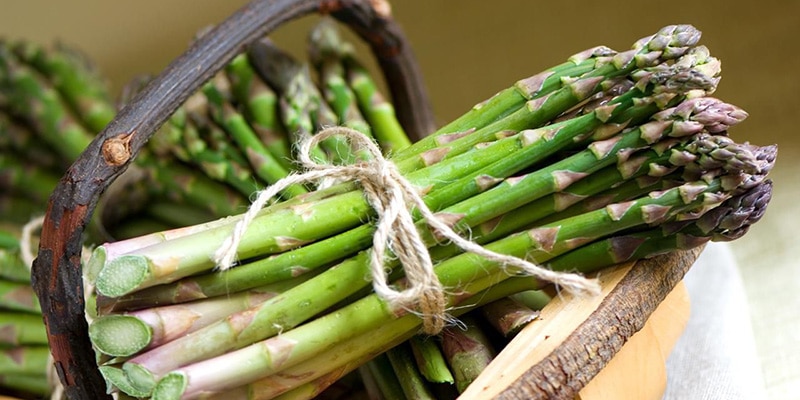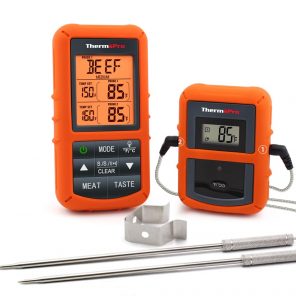The customer service team is always listening, taking notes, and quantifying complaints to ensure our products are continually improved. Due to selling directly to you, the customer, via Amazon, we can use product reviews to help us improve our existing products or help further development of new products.
Roasted/Grilled Asparagus Recipes - The Right Temp to Cook
Table of Contents
Asparagus is one of those vegetables that can be intimidating to cook because it’s not your average vegetable, which can leave you puzzled on how to prepare it. However, when it’s cooked right, it can be one of those vegetables you never knew you loved. And it is versatile enough to be prepared some different ways, whether its oven roasted asparagus as the perfect precursor to your elegantly planned dinner or smoky, buttery grilled asparagus as the perfect accompaniment to a summer weeknight meal.
It’s also packed full of valuable nutrients, including vitamin K, E, C, and A, folate, which helps with cognitive function, chromium, which studies show may help reduce cravings, hunger, and overeating, fiber, which helps reduce salt and excess water, and antioxidants, which provide anti-aging benefits, making it one of nature’s best vegetables. It has also been shown to protect against some cancers.
Whichever way you prepare asparagus, it is quick and easy to cook, and it can be served fresh from the heat or at room temperature.
How to Choose Asparagus?
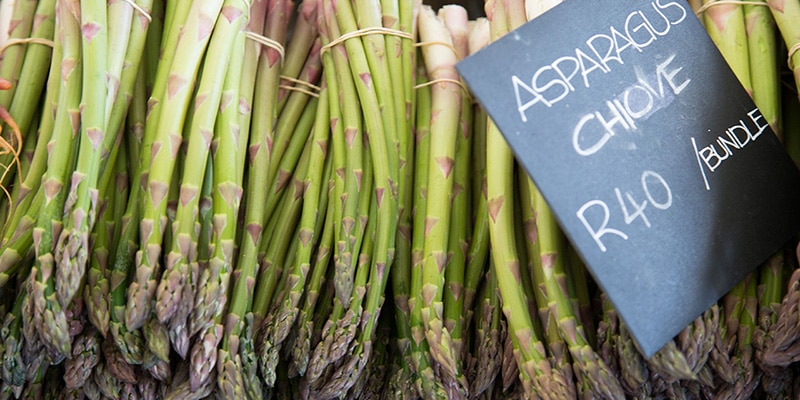
Asparagus comes in different colors, including green, which is the most common type, white, which is most commonly found in Europe, and purple, which turns dark green once it is cooked and tastes similar to green asparagus.
They also vary in thickness from very thin, which is best for sautéing and stir-fries, to extra large, which is excellent for grilling, roasting, steaming and serving whole. There are also medium size asparagus, which works well with any cooking method.
When shopping for fresh asparagus, it is best to purchase them during their peak season, which is in the Spring, for maximum flavor. The Spring season will vary from region to region, so keep this in mind.
Look for spears that are vivid green with small, tightly closed tips. If the spears look ridged, it means they have lost their flavor. You should also check that the ends of the asparagus are not brown and dried out, which is another indicator that they have lost their taste.
The price of asparagus differs based on various factors, including the season. For instance, if you purchase asparagus when it is in season in your area, they will most likely cost less; otherwise, they will have to be imported, which may cost a bit more. The size and weight of the asparagus will also affect their cost, which according to the national average hovers around about $3 a pound when they are in season.
Once you get the asparagus home, to properly store them, don’t wash them. Merely place them upright in a container that contains about an inch of water and then place them into the refrigerator uncovered. Or, you can wrap them in a damp paper towel, place them in a bag, and then store them in the refrigerator for up to 3 days.
Different Ways to Cook Asparagus
When choosing how to cook asparagus, simply let the recipe’s prep and cooking time, as well as the occasion, dictate how you prepare it. For instance, if you have finicky vegetable eaters, simply try wrapping each spear in a slice of bacon or prosciutto before roasting or grilling it, which is sure to appease even the most avid meat eater.
Asparagus also tastes excellent sautéed in butter or olive oil. It can also be simmered, blanched, steamed, battered, and wok-fried, or simply slice it thinly and then add it to a salad to enjoy it raw. However, for a basic crowd-pleasing asparagus recipe, try the following roasted asparagus recipe.
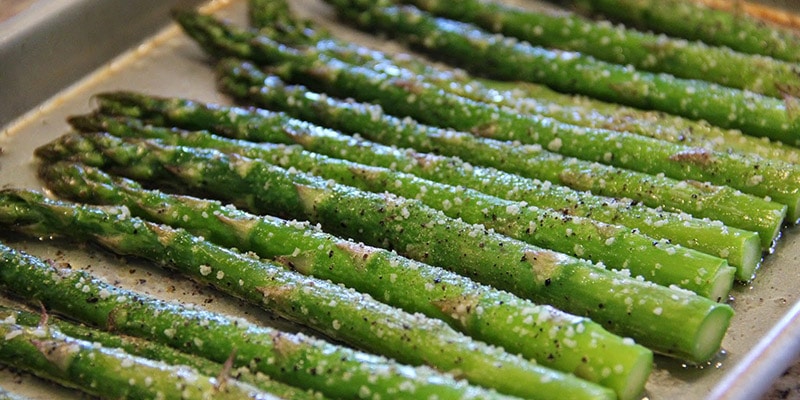
Roasted Asparagus Recipe
Ingredients
- 2 pounds of fresh asparagus
- Minced garlic
- Olive oil
- Sea salt, plus extra for sprinkling
- Freshly ground black pepper
- Grated Parmesan cheese
Instructions
1. Heat the oven to 400° F.
2. Wash the asparagus and then snap off the ends.
- The ends of asparagus have a wood-like texture; therefore, you will need to remove the bottom one inch part of the vegetable where it has started to lose its moisture.
- To remove this rough part of the asparagus, hold the stalk with both hands and then locate the natural snapping point near the end of the asparagus, which is where the stalk starts to turn white.
- Then, bring your hands close to the bottom of the stalk and snap off the end, which should break off naturally. However, if you hold the stalk too high and then snap it, it will cause the asparagus to break in the middle, which will cause you to lose a lot of the good part of the vegetable.
- Continue this process with the entire bunch of asparagus. Once you have removed all the ends from the asparagus, you can simply save the ends and then use them to make a stock, or use them for compost. However, be warned, the ends are not good for eating.
- If the spears are large, then you may also want to peel them. Larger asparagus have a thicker exterior that doesn’t become tender once it is cooked. Therefore, it is best to peel away the lower part of the stalk on larger spears to help ensure a tender bite all the way through.
- To peel the asparagus, place the vegetable flat on your prepping surface, then using a vegetable peeler, peel away the tough skin from about halfway up the stalk down to the end. However, avoid peeling the top.
- You should also be sure to remove just a thin layer of the skin to avoid removing too much of the tasty center. The asparagus can also be peeled a few hours prior to cooking and then wrapped and stored in the refrigerator.
3. Once you have successfully prepped the asparagus, place the asparagus directly onto a baking sheet, or you can line the sheet with parchment paper for easy cleanup.
4. Drizzle the asparagus with olive oil and then sprinkle them liberally with salt, pepper, minced garlic, and Parmesan cheese. Toss the asparagus to coat them thoroughly.
5. Spread the asparagus in a single layer, and if you’d like, sprinkle them with a bit more salt, pepper, and Parmesan cheese.
6. Roast the asparagus until they are caramelized and tender but crisp, about 10 to 25 minutes.
7. Serve.
For an added twist, you can also add a splash of lemon juice or garnish the asparagus with fresh lemon slices before roasting it. You could also top the asparagus with a decadent, creamy sauce, such as a hollandaise sauce, a Burre Blanc sauce, or a lemon butter sauce, before serving for added flair.
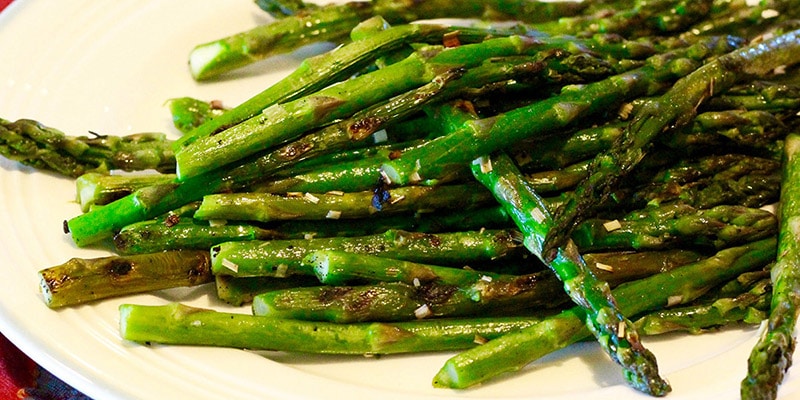
Grilled Asparagus Recipe
Asparagus also tastes greatly grilled, which gives them a bold, charred flavor that can perfectly complement your favorite grilled burger, chicken, or steak recipe.
Instructions
1. Preheat the grill, or grill pan, to medium-high heat.
2. Wash and trim the asparagus and then place them in a large bowl.
3. Drizzle the spears with olive oil and then season them with salt and pepper, or your favorite grill seasonings. Toss the asparagus to get them evenly coated.
4. Place the asparagus in a single layer on the grill and then allow them to cook, turning them periodically, until they are tender and charred on all sides, about 3 to 4 minutes.
5. Serve.
What Temp to Cook Asparagus?
When roasting or grilling asparagus, it is best to cook it using a high temperature to get good caramelization, which will give the asparagus a sweet, roasted or smoky flavor. If you are roasting asparagus in the oven, this temperature is between 400°F to 425°F. If you are preparing it on the grill, this temperature is medium-high heat.
You should also be sure to turn the asparagus about halfway through the cooking time to ensure even flavor. A good food thermometer, such as the ThermoPro TP-20 Wireless Remote Digital Cooking Thermometer, should also be used during cooking to ensure the proper internal temperature.
The asparagus is done when the outside is brown, the inside is tender but crisp, and the internal temperature reads 135°F. However, you should remove the asparagus from the heat when it is just underdone to allow for carry-over cooking.
Asparagus done right may have you find yourself reaching for it more often. It is also a good source of essential nutrients so you can feel good about eating it. Just remember, for the best flavor and also the best price, be sure to purchase the spears when they are in season in the Spring and don’t forget to remove the tough ends and trim the lower parts of the stalk on larger asparagus before cooking it for a smooth and even texture throughout. Asparagus is also quick and versatile to cook, so don’t be afraid to try different cooking methods and recipes until you find the one or ones your family likes best.
-
ThermoPro TP20 Digital Wireless Meat Thermometer
$59.99Original price was: $59.99.$49.99Current price is: $49.99. $49.99Rated 4.92 out of 5Add to cart

